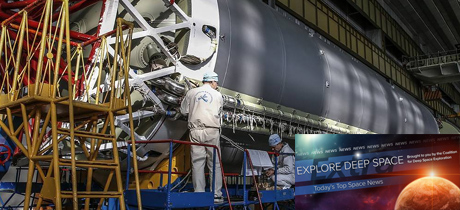In Today’s Deep Space Extra… Vice President Mike Pence predicts growing bipartisan support for NASA’s accelerated 2024 return to the surface of the Moon with human explorers. Russia looks to late this year or early next to add a long delayed research module to the International Space Station (ISS). Japan approved a mission to survey and return a sample from a Martian moon.
Human Space Exploration
White House, NASA emphasize bipartisan support for lunar plans
Coalition Member in the News – Boeing
SpaceNews.com (2/20): National support for NASA’s Artemis initiative, a strategy to accelerate a return to the surface of the Moon with human explorers in 2024, will grow once the agency’s Commercial Crew program partners, Boeing and SpaceX, resume the transportation of astronauts to and from the International Space Station (ISS), according to Vice President Mike Pence. Pence spoke to NASA workers during a visit to the Langley Research Center on Wednesday.
Russia’s Proton-M rocket ready to deliver Nauka research lab to Space Station
TASS of Russia (2/21): Russia is preparing a Proton rocket for the launch of the long delayed Nauka multi-purpose research module to the International Space Station (ISS) in late 2020 or early 2021, Dmitry Rogozin, head of Russia’s space agency, told the Russian Association of Aviation and Space Insurers on Friday.
ISRO to validate design, engineering of rocket carrying India’s first manned mission
The Statesman of India (2/21): The Indian Space Research Organization (ISRO) plans tests this year to validate the rocket and spacecraft that will enable it to launch its astronauts into Earth orbit. An uncrewed flight is planned by the end of next year, a crewed flight involving astronauts training now in Russia by the end of 2022. ISRO intends to build its own astronaut training facility as well, according to K Sivan, who chairs the agency.
Space Science
NASA adds return sample scientists to Mars 2020 leadership team
NASA/Jet Propulsion Laboratory (2/20): NASA has added two scientists to the Mars 2020 Project Science Group, the rover mission’s leadership council. Chris Herd, from the University of Alberta, and Tanja Bosak, from the Massachusetts Institute of Technology (MIT), will offer advise intended to help bring samples of Mars back to Earth for analysis with the latest laboratory technologies. Mars 2020 is scheduled to launch in July and land on Mars at Jezero Crater early next year to explore for past and possibly still habitable environments. Also, the rover will gather and cache samples of rock and soil. NASA and the European Space Agency (ESA) are devising a follow on mission to return the samples to Earth.
Japan gives the ‘Go’ to sample return mission to Mars and Moon
Futurism.com (2/20): The Japan Aerospace Exploration Agency (JAXA) announced Thursday plans to launch a mission to Mars to survey the moons Phobos and Deimos over three years and return with a 10 gram subsurface sample of Phobos. The Martian Moons Exploration Mission, launched in 2024, would attempt to identify the source of the two moons, whether they are captured asteroids or debris from an impact by another object with Mars itself. It’s possible the mission could become the first to make a round trip to the Mars system.
What’s up with that rock? China’s Moon rover finds something strange on the far side.
Space.com (2/20): China’s Yutu-2 rover, part of the Chang’e 4 lander mission that pioneered soft landings at the Moon’s south pole in January 2019, has discovered a surprisingly young rock, which may break ground scientifically on the geological history and evolution of the previously unexplored lunar region.
Op Eds
Who should join the U.S. Space Force?
SpaceNews.com (2/20): The U.S. Space Force has emerged. Though comprised primarily of U.S. Air Force personnel, it’s unclear whether U.S. Army and Navy capabilities should be merged with the Space Force as well. “Multi-domain warfare, prior studies, technology and history should be in the forefront of the conversation. We will need motivated recruits from every branch of the military to bring diverse skills and experiences to shape our newest service and ensure its success,” writes U.S. Army Maj. Ryan Stephenson, a space operations officer assigned to the Office of the Assistant Secretary of the Air Force for Space Acquisition and Integration.
Other News
MIT develops plans to deflect “planet-killer” asteroids bound for Earth
CBS News (2/20): MIT scientists are developing strategies to determine which asteroids that pass close to the Earth to pose a possible impact threat and the best strategies to alter their course based on such factors as mass and momentum. An impact or gentle nudge is preferred over a nuclear explosion.
SpaceX wants to build its Mars Starship at Port of L.A. again
Los Angeles Times (2/20): The Los Angeles Board of Harbor Commissioners approved a permit for SpaceX on Thursday allowing the company to lease land for the manufacture of aerospace products, potentially the reusable Starship rocket. The Los Angeles City Council is to consider the matter as well next week, a necessary step. According to a council member and others involved in the matter, SpaceX has determined it needs more than the space available at facilities in South Texas produce the Starship and nearby port facilities to ship hardware.

